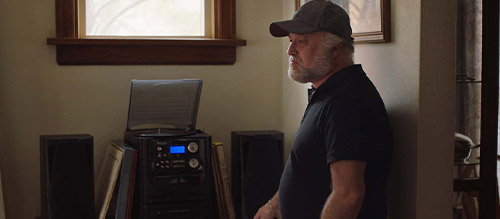No Ordinary Man (2020) Review – BFI Flare
No Ordinary Man (2020)
Directors: Aisling Chin-Yee, Chase Joynt
Screenwriters: Aisling Chin-Yee, Amos Mac
The right wing media would like us to believe that trans people are a new thing. But as No Ordinary Man shows, this is simply not the case.
Aisling Chin-Yee and Chase Joynt’s collaborative documentary No Ordinary Man tells the story of trans masculine jazz musician Billy Tipton. Told through a mix of archival footage, the first-hand perspective of Tipton’s child, the insights of trans people living today, and recordings of trans men auditioning to play Tipton in a film, No Ordinary Man is an eclectic and compelling documentary.
Billy Tipton’s story is one that came into the limelight when, upon his death, it was discovered that he was biologically female. Billy’s family, specifically his son and his wife Kitty, maintain to this day that they never knew. As such, No Ordinary Man inherits the narrative of transphobia, outlining the dangerous narrative the media creates about trans people “pretending” to be of another gender, in this case Billy Tipton “pretending” to be a man in order to play music.
No Ordinary Man explicitly outlines the transphobic press coverage surrounding the musician’s death, its use of transphobic language, and the exploitation of his family’s grief. Furthermore, there is an implication that part of the outrage is how people’s knowledge of events would create a public consensus that his wife Kitty is a lesbian, illustrating not only the inherent transphobia of media and wider culture but the homophobia of both too. Though at times uncomfortable and upsetting to witness, the footage and recollections bring into perspective how far the community has come since Tipton’s death in 1989. Whilst No Ordinary Man is about the struggle of acceptance and the historical discrimination Tipton, his family and the wider trans/LGBTQ+ community, it is equally about the positive side of history, and a celebration of what can happen next.
This documentary is not only a journey for us, but also for Billy’s son, Billy Jr. Jr meets other trans men who see his father as an inspiration, and it is clear that this is one of the first times that Billy Jr has heard his father be spoken about in a positive way. It’s an emotional hook expanded upon by auditions held for trans men looking to play Tipton in a would-be film production, each of whom help to give insight into Billy’s life without attempting to speak for him; offering insight on events based on their real-life experiences and therefore highlighting contemporary trans issues.
Though unique and at first engrossing, the stylistic choice of having auditions as a part of the narrative quickly becomes gimmicky when you realise that the auditions are just for the sake of the documentary. It perhaps would have been more authentic to let the men simply sit and talk about their own stories.
No Ordinary Man could also have benefitted from a more focused perspective. Whilst clearly about Billy Tipton – the talking heads each claiming they’d ask the musician about his music if ever they could meet him – little is done to celebrate or archive his career. Weaving his music throughout the film might have brought it more focus, and could have established the musical side of Tipton as being just as important as the guest commentators suggest.
Cinema is still woefully bad in terms of representing trans people, particularly trans masculine people, and No Ordinary Man is a big step towards addressing this. Not only does it tell of a trans man’s story, but it incorporates the stories of many, its subject Billy Tipton connecting the past and present together in an insightful and engaging piece that is cause for celebration by some and will open the minds of others.
19/24


